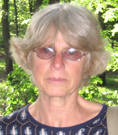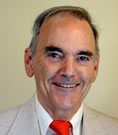Three UC Santa Cruz professors are among the mathematical scientists from around the world named Fellows of the American Mathematical Society (AMS) for 2013, the program's initial year. They are Richard Montgomery and Maria Schonbek, both professors of mathematics, and Harold Widom, professor emeritus of mathematics.
The inaugural class of 1,119 AMS fellows represents over 600 institutions. The fellows are recognized by the society for their outstanding contributions to the creation, exposition, advancement, communication, and utilization of mathematics. A complete list of this year's class of fellows is available online.
Montgomery is known for his work on the three-body problem from celestial mechanics, one of the oldest problems in mathematics and physics. Since 2000, he has worked primarily on this N-body problem and the geometry of distributions. He joined the UCSC faculty in 1990.
Schonbek's research focuses on non-linear partial differential equations derived from models in fluid dynamics. The primary questions she is concerned with are related to the qualitative behavior of solutions, specifically questions concerning long-time behavior of solutions. She has been a UCSC faculty member since 1986.
Widom is well known for his work on random matrix theory, which has earned several awards for him and his collaborator, Craig Tracy of UC Davis. They discovered a new class of distribution functions called Tracy-Widom distributions that are of great interest to physicists. A fellow of the American Academy of Arts and Sciences, Widom has been a UCSC faculty member since 1968.
"The new AMS Fellows Program recognizes some of the most accomplished mathematicians--AMS members who have contributed to our understanding of deep and important mathematical questions, to applications throughout the scientific world, and to educational excellence," said AMS president Eric M. Friedlander. "The AMS is the world's largest and most influential society dedicated to mathematical research, scholarship, and education. Recent advances in mathematics include solutions to age-old problems and key applications useful for society."





